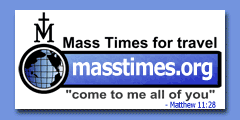
The Vatican

Good Counsel Homes
Catholic Places
Shrines, Basilicas, Cathedrals
Beautiful Holy Places
Catholic Gifts
Scapulars. Jewelry. Crucifixes
Stylish & Modest Fashion
Rosary Crusades
Rosary Crusade for America and The World

Catholic Parents
Online


Faithful Citizenship
Current News from:

American Life League
pro-life Americans


Catholic Pro-Life
Committee
|
Almost 1,600 Pastors Defy IRS. Preach Politics From Pulpit
October 8, 2012 -- Steven Ertelt -- LifeNews.com
A record number of pastors this past Sunday defied IRS rules and regulations and preached politics from their pulpits as a way to protest the restrictive guidelines placed on churches.
A total of 1,586 pastors participated in Pulpit Freedom Sunday in all 50 states, the District of Columbia, and Puerto Rico. This is the fifth annual event sponsored by Alliance Defending Freedom, a pro-life legal group.
The registered pastors committed to preach sermons that present biblical perspectives on the positions of electoral candidates. In so doing, they exercised their constitutionally protected freedom to engage in religious expression from the pulpit despite an Internal Revenue Service rule known as the Johnson Amendment that activist groups often use to silence churches by threatening their tax-exempt status.
"Pastors should decide what they preach from the pulpit, not the IRS," said Senior Legal Counsel Erik Stanley. "It's outrageous for pastors and churches to be threatened or punished by the government for applying biblical teachings to all areas of life, including candidates and elections. The question is, 'Who should decide the content of sermons: pastors or the IRS?'"
"No government-recognized status can be conditioned upon the surrender of a constitutionally protected right," Stanley explained. "No one would suggest a pastor give up his church's tax-exempt status if he wants to keep his constitutional protection against illegal search and seizure or cruel and unusual punishment. Likewise, no one should be asking him to give up his church's tax-exempt status to be able to keep his constitutionally protected right to free speech."
Pulpit Freedom Sunday is an event associated with the Pulpit Initiative, a legal effort designed to secure the free speech rights of pastors in the pulpit. Alliance Defending Freedom hopes to eventually go to court to have the Johnson Amendment struck down as unconstitutional for its regulation of sermons, which are protected by the First Amendment.
Pulpit Freedom Sunday began in 2008 with 33 participating pastors. Participation increased each year, with last year's participation blossoming to 539.
In additional remarks about the event, pro-life attorney Stanley explains why it was important:
In the wake of the most successful Pulpit Freedom Sunday to date, a look at opponents who have commented publicly about the event in recent days shows that they are still attacking it for something it's clearly not. In other words, the arguments against Pulpit Freedom Sunday fail because the premise for those arguments is all wrong.
This year, as part of the event, nearly 1,600 pastors nationwide preached sermons that analyzed the positions of various political candidates-an exercise in free speech that violates a flawed Internal Revenue Service rule known as the Johnson Amendment. The goal is to create a court case that will challenge the constitutionality of the rule in court.
But objectors-such as Bloomberg View, as just one example-have made several fundamental errors in their assertion that this is really just all a taxation issue that has nothing to do with free speech.
That editorial admits, "The line between religious belief and political action is often indistinct," but then states that "pastors demanding government tax preferences for political crusades have clearly crossed it."
But pastors who participate in Pulpit Freedom Sunday are not engaging in a "political crusade." Instead, they are simply applying Scripture and theological doctrine to the positions held by the candidates running for office. Pastors have been applying scriptural teaching to circumstances facing their congregations for centuries. This is not "political" speech. Rather, it's core religious expression from a spiritual leader to his congregants. That kind of expression is at the very center of the freedom of speech and religion protections in the First Amendment.
The real question is this: When has the government ever been allowed to condition any government-recognized status (such as tax-exempt status) on the surrender of a constitutionally protected freedom?
Those who so easily say, "If you want to exercise your right to free speech, just give up your tax-exempt status," don't see the obvious problem with that line of reasoning. Are they also prepared to say, "If you want to exercise your right to be free from unreasonable search and seizure, just give up your tax-exempt status" or "if you want to maintain your right against cruel and unusual punishment, just give up your tax-exempt status"?
Just as with those other rights, free speech is a constitutionally protected freedom, not a privilege that the government can grant or revoke while dangling the tax-exempt status of the speaker's church over his head. That's why the IRS rule against free speech for pastors should be struck down as unconstitutional.
Another straw-man claim that has been put forth is that Congress created the Johnson Amendment to ensure that churches don't get a subsidy for political activity. First of all, as is well documented, this is not why Congress created the rule. Then-Senator Lyndon Johnson introduced the rule without debate and got it passed in 1954 with little notice as a means to silence non-profit groups that opposed his bid for re-election. Neither he nor Congress had any intention of applying the rule to churches to silence their religious speech, no matter how much groups like Americans United for Separation of Church and State and the Freedom From Religion Foundation would love for people to believe otherwise.
Secondly, the federal government does not "subsidize" religion when the IRS grants a tax-exempt status to a church. In fact, tax exemption cannot be not a government subsidy unless you believe that no one can actually have their own money and that it all belongs to the government-an idea that the U.S. Supreme Court rejected just last year.
It's not the case that the church has a bunch of the government's money and must justify why the government can't demand it back. No, the government has a duty to justify why it must take money that belongs to its citizens.
And since churches, like most charities, are non-profits that have been outside of the government's legitimate tax base since the founding of the nation, the government has no automatic right to the church's money just because its pastor won't give up his constitutionally protected right to free speech.
Some point to the deduction individuals receive for their church contributions as a "benefit" that justifies suppressing the free speech and freedom of religion of churches. But individuals can also claim a deduction for contributions to other tax-exempt groups, such as veterans' organizations, who are not subject to the Johnson Amendment. Why should churches be treated any differently?
Some cynics and conspiracy theorists like to point to a handful of church excesses and demand that all churches be burdened with taxes. But that doesn't wash either. The vast majority of churches are far from "wealthy" and do tremendous good for their communities-often relieving the government and taxpayers of having to provide a whole host of community services. And that's just one reason why the government has never done taxpayers and all citizens the disservice of taxing churches and charities. Reducing their ability to do good does no one any good whatsoever.
Most troubling of all is the ease with which some who oppose Pulpit Freedom Sunday like to cite the so-called "separation of church and state" while at the same time advocating that the state regulate the speech of the church. No, as America's founders would have agreed, a pastor is the one who should determine what he says from the pulpit, not the federal government-and that is as it should be.
Source: lifenews.com
Abortion is not Health Care
|
Great Gift Ideas:





|






